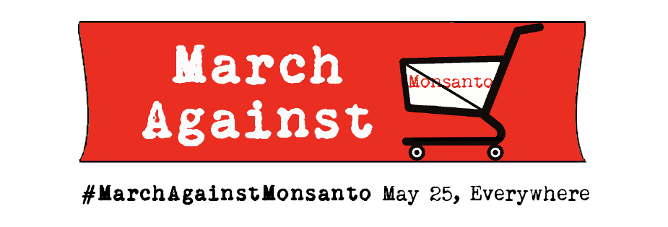On May 25, activists around the world will unite to March Against Monsanto.

Why do we march?
- Research studies have shown that Monsanto’s genetically-modified foods can lead to serious health conditions such as the development of cancer tumors, infertility and birth defects.
- In the United States, the FDA, the agency tasked with ensuring food safety for the population, is steered by ex-Monsanto executives, and we feel that’s a questionable conflict of interests and explains the lack of government-led research on the long-term effects of GM products.
- Recently, the U.S. Congress and president collectively passed the nicknamed “Monsanto Protection Act” that, among other things, bans courts from halting the sale of Monsanto’s genetically-modified seeds.
- For too long, Monsanto has been the benefactor of corporate subsidies and political favoritism. Organic and small farmers suffer losses while Monsanto continues to forge its monopoly over the world’s food supply, including exclusive patenting rights over seeds and genetic makeup.
- Monsanto's GM seeds are harmful to the environment; for example, scientists have indicated they have contributed to Colony Collapse Disorder among the world's bee population.
What are solutions we advocate?
- Voting with your dollar by buying organic and boycotting Monsanto-owned companies that use GMOs in their products.
- Labeling of GMOs so that consumers can make those informed decisions easier.
- Repealing relevant provisions of the US's "Monsanto Protection Act."
- Calling for further scientific research on the health effects of GMOs.
- Holding Monsanto executives and Monsanto-supporting politicians accountable through direct communication, grassroots journalism, social media, etc.
- Continuing to inform the public about Monsanto's secrets.
- Taking to the streets to show the world and Monsanto that we won't take these injustices quietly.
We will not stand for cronyism. We will not stand for poison. That is why we March Against Monsanto.
